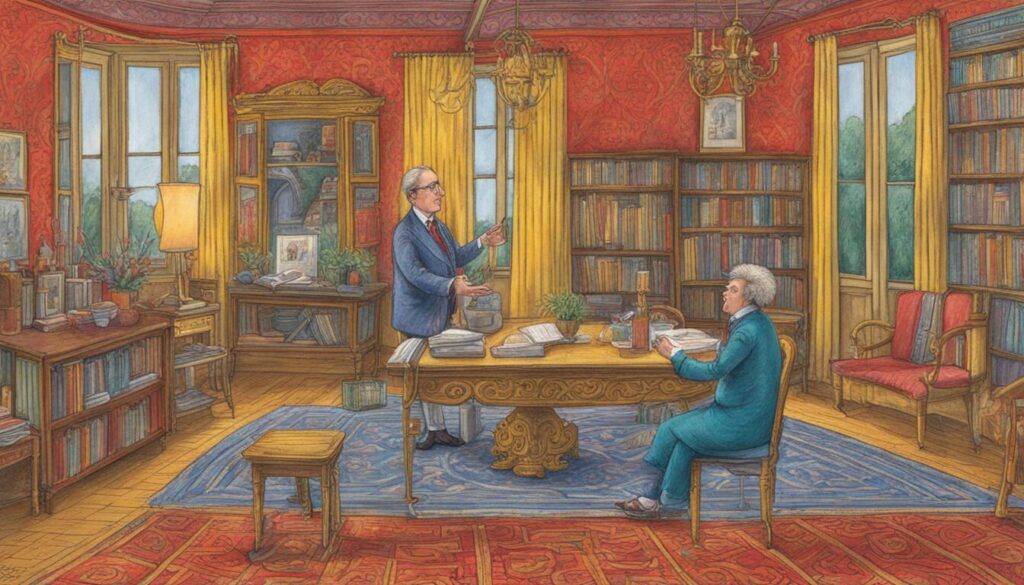Welcome to our in-depth audiobook review of Roz Chast’s memoir, “Can’t We Talk about Something More Pleasant?” This highly acclaimed memoir tells the story of the author’s parents in their final years, exploring the complexities of family relationships and the challenges of aging.
Chast’s unique style and poignant storytelling make this memoir a must-read for all fans of the genre. In this article, we will analyze the narration, performance, writing style, themes, and emotional impact of “Can’t We Talk about Something More Pleasant?” in detail.
About the Author, Roz Chast
Roz Chast, born in Brooklyn in 1954, is a critically acclaimed author, cartoonist, and illustrator.
Chast began her career in the late 1970s writing cartoons for The New Yorker and has since published over 1,000 of them. She has also written and illustrated several books, including the graphic memoir, “Can’t We Talk about Something More Pleasant?”
Chast’s works are known for their unique humor and poignant observations about daily life. Her art style is recognizable for its hand-drawn, quirky characters and visuals.
Her previous works include “Theories of Everything: Selected, Collected, and Health-Inspected Cartoons of Roz Chast, 1978-2006,” “Mondo Boxo,” and “The Four Elements.”
Awards and Achievements
| Award | Year | Work |
|---|---|---|
| The Reuben Award for Outstanding Cartoonist of the Year | 2015 | Can’t We Talk About Something More Pleasant? |
| National Book Critics Circle Award for Autobiography | 2014 | Can’t We Talk About Something More Pleasant? |
| The Kirkus Prize for Nonfiction | 2014 | Can’t We Talk About Something More Pleasant? |
Chast’s memoir, “Can’t We Talk about Something More Pleasant?” received critical acclaim and was a finalist for the National Book Award for Nonfiction in 2014. It also won the National Book Critics Circle Award for Autobiography, The Reuben Award for Outstanding Cartoonist of the Year, and The Kirkus Prize for Nonfiction.
Chast’s works have had a significant impact on the cartooning and literary communities. She continues to produce thought-provoking and entertaining works that resonate with audiences of all ages.
Memoirs: Exploring Life Stories through Audiobooks
As a genre, memoirs have gained immense popularity in recent years, providing readers with a glimpse into the lives of remarkable individuals. Through the unique lens of personal narratives, readers can experience a range of emotions, from heartache to inspiration.
Listening to memoirs through audiobooks adds another layer of richness to the experience. Narrators breathe life into the written text, creating an immersive audio experience that transports listeners into the storyteller’s world. The power of storytelling is amplified through the emotional impact of hearing the author’s own voice and the nuances of their story.
Whether it’s the story of a survivor, a celebrity, a politician, or an everyday person, memoirs offer a unique perspective on life. The themes explored in memoirs resonate with readers on a deeper level than most other genres since they’re grounded in real-life experiences that people can relate to.
“Memoirs have a unique way of breaking down barriers and connecting people through storytelling. They allow readers to understand and empathize with the author’s experiences and emotions, creating a connection that is hard to match in other genres.”
Moreover, memoir authors share their stories with the intention of leaving a lasting impression and impact on their readers. They hope that their stories inspire change, fuel self-reflection, and offer a new perspective on the world.
Listening to a memoir through an audiobook makes it easier to connect with the story’s message, as listeners can focus solely on the author’s words. It’s a deeply personal experience that imprints long-lasting memories and reminds us of the power of sharing our own stories.
Synopsis of “Can’t We Talk about Something More Pleasant?”
Published in 2014, “Can’t We Talk about Something More Pleasant?” is a graphic memoir written and illustrated by Roz Chast. It details the author’s experience of caring for her aging parents in their final years of life.
The memoir opens with Chast’s discovery that her parents, George and Elizabeth, are no longer capable of living on their own. From there, she recounts the challenges and emotions that come with taking care of elderly and ill parents, from navigating the healthcare system to confronting unresolved family issues.
Chast’s signature humor is present throughout the memoir, providing a lighthearted touch to the otherwise heavy subject matter. However, the memoir also delves into the pain and heartache that come with the loss of loved ones.
The memoir’s themes include the realities of aging, the complexities of family dynamics, and the process of coming to terms with death. Its honesty and relatability have earned it critical acclaim, including being a finalist for the National Book Award, receiving the National Book Critics Circle Award, and being named one of the top ten books of the year by The New York Times Book Review.
Understanding the synopsis of “Can’t We Talk about Something More Pleasant?” is essential in providing context for a comprehensive audiobook review of this touching memoir.
Narration and Performance
One of the most notable features of the audiobook version of “Can’t We Talk about Something More Pleasant?” is the exceptional narration and performance. Roz Chast narrates the memoir herself, bringing a personal touch to the storytelling that adds to the emotional depth of the narrative. Her voice is warm, engaging, and sincere, creating an intimate connection with the listener.
Chast’s performance also showcases her talent for comedy, allowing her humor to shine through in moments where it is needed most to alleviate the heaviness of the subject matter. Her delivery is natural and effortless, bringing to life the dialogue and interactions with her parents in a way that feels authentic and compelling.
“Roz Chast narrates the memoir herself, bringing a personal touch to the storytelling that adds to the emotional depth of the narrative.”
The audiobook format also adds an immersive quality to the experience, transporting the listener directly into Chast’s world and allowing them to fully engage in the story. Music is incorporated throughout the memoir, providing an additional layer to the audio production that enhances the overall performance.

All in all, the narration and performance in the audiobook version of “Can’t We Talk about Something More Pleasant?” deeply enrich the storytelling experience, providing a powerful and resonant portrayal of Chast’s life and family.
Writing Style and Themes
Roz Chast’s writing style in “Can’t We Talk about Something More Pleasant?” is a unique blend of humor, sincerity, and introspection that captivates readers. Her use of witty humor and quirky illustrations lightens the mood of the difficult subject matter, making it easier for readers to engage with the memoir.
The themes prevalent in the memoir include family relationships, aging, illness, death, and loss. Chast’s writing captures the emotions and complexities of these themes, evoking a sense of empathy and understanding from readers.
The impact of Chast’s writing style and themes is striking, as readers often find themselves reflecting on their own experiences and relationships. The memoir’s humorous elements also provide a sense of relief and levity for readers dealing with similar issues in their own lives.
“Roz Chast’s writing captures the emotions and complexities of family relationships, aging, illness, death, and loss, evoking a sense of empathy and understanding from readers.”
Humor and Heartache in Family Life
Roz Chast’s memoir, “Can’t We Talk about Something More Pleasant?” masterfully balances the delicate and poignant juxtaposition between humor and heartache in family life. Throughout the book, Chast shares personal recollections of her parents’ aging and eventual decline, painting a vivid picture of the love, frustration, and grief that accompany such moments.
Chast’s use of humor provides a welcome respite from the emotionally fraught content of the memoir, often making light of difficult situations and highlighting the absurdity of life’s ups and downs. However, this humor never detracts from the gravity of the underlying situations, only serving to underscore the depth of her love and the poignancy of the human experience.
Examples of this balance between humor and heartache in family life can be seen in Chast’s depictions of her parents’ quirks and foibles. For instance, she describes her mother’s difficulty in parting with possessions, leading to comical clashes with her father over clutter in the house. These lighthearted moments are juxtaposed with more serious ones, such as Chast’s struggles in coming to terms with her parents’ mortality and navigating the challenges of caregiving.
“Sometimes the laugh came while I was in mid-sob…it was just emotion and the laughter was a way to relieve it.”
Chast’s unique ability to capture the complexity of the human experience in all of its emotional highs and lows is both relatable and timeless. It is a testament to her skill as a writer and her deep understanding of the human heart.
Emotional Impact and Relatability
The emotional impact and relatability of Roz Chast’s memoir, “Can’t We Talk about Something More Pleasant?”, are significant factors that contribute to its overall appeal and lasting impact. Through her candid and heartfelt storytelling, Chast invites the reader into her personal journey of navigating the challenges and complexities of caring for aging parents. Her experiences resonate with readers who have faced similar situations, evoking a range of emotions from empathy to grief.
The memoir’s relatability stems not only from its subject matter but also from Chast’s approach to storytelling. She incorporates humor and wit into her narrative, providing moments of levity amidst the emotional weight of the story. This balance between lightheartedness and heartache makes the memoir all the more relatable and authentic.
The emotional impact and relatability of “Can’t We Talk about Something More Pleasant?” are heightened through the audiobook format. The narrator’s voice adds another layer of emotion to the story, amplifying the impact of Chast’s words. Additionally, the audiobook allows for a more immersive experience, further connecting the listener to the memoir’s themes and messages. Overall, the emotional resonance and relatability of “Can’t We Talk about Something More Pleasant?” make it a powerful and enduring memoir that resonates with readers long after the final page.
Critical Reception and Awards
Since its publication in 2014, “Can’t We Talk about Something More Pleasant?” has received widespread critical acclaim for its honest and heartfelt depiction of family life, aging, and end-of-life care. Roz Chast’s memoir has been featured on several bestseller lists, including The New York Times, and was a 2014 National Book Award Finalist.
The memoir’s blend of humor and heartache has struck a chord with readers and critics alike. The Washington Post praised Chast’s “sardonic wit,” while the Los Angeles Times commended her “compassionate eye.” Its relatable themes have garnered attention from the Pulitzer Prize committee, who awarded the book a finalist place in the Biography or Autobiography category in 2015.
| Award | Year | Recipient |
|---|---|---|
| National Book Award Finalist | 2014 | Roz Chast |
| Pulitzer Prize finalist in Biography or Autobiography | 2015 | Roz Chast |
Roz Chast’s memoir continues to resonate with readers, inspiring and moving them through the ups and downs of family life and end-of-life care.
Comparison to Other Memoirs
While there are many compelling memoirs out there, “Can’t We Talk about Something More Pleasant?” by Roz Chast stands out for its unique approach to storytelling. Unlike other memoirs that rely solely on prose, Chast incorporates her signature cartoon illustrations to enhance the reader’s experience. This combination of text and visuals allows for a more nuanced and emotional narrative that sets it apart from other memoirs.
That being said, there are still great memoirs that rely solely on prose and are just as impactful. One such example is “The Glass Castle” by Jeannette Walls. In this memoir, Walls recounts her unconventional and difficult upbringing, exploring themes of resilience and forgiveness. Similarly, “Educated” by Tara Westover details her upbringing in a survivalist family and her journey towards a higher education. These memoirs, like Chast’s, demonstrate the power of personal narratives in illuminating the human experience.
Comparison Table
| Memoir | Format | Unique Qualities |
|---|---|---|
| “Can’t We Talk about Something More Pleasant?” by Roz Chast | Combination of text and illustrations | Uses humor and visual elements to enhance emotional impact |
| “The Glass Castle” by Jeannette Walls | Prose | Offers a raw and honest look at Walls’ unconventional upbringing |
| “Educated” by Tara Westover | Prose | Explores the transformative power of education and the impact of family dynamics |
Note: The table is for illustrative purposes only and is not intended to be exhaustive.
Impact and Legacy of “Can’t We Talk about Something More Pleasant?”
“Can’t We Talk about Something More Pleasant?” has left a lasting impact on readers and the literary world. Roz Chast’s courageous decision to tell her family’s story with humor and heartache resonated with audiences and critics alike, propelling the memoir to critical acclaim.
The legacy of “Can’t We Talk about Something More Pleasant?” is evident in its lasting influence on the world of memoirs. As one of the foremost examples of the genre, Chast’s memoir has set a standard for authenticity and vulnerability in storytelling that has inspired future memoirists.
The memoir’s exploration of family relationships and themes of loss and grief have been widely praised for their emotional impact and relatability to readers. The raw honesty and humor in Chast’s writing have made “Can’t We Talk about Something More Pleasant?” a beloved and influential work in the literary canon.
The Impact of Chast’s Memoir on the Literary World
Chast’s memoir opened up conversations about family dynamics and end-of-life decisions that were previously considered taboo. Its unflinching portrayal of the difficulties of caregiving and the grieving process have been instrumental in raising awareness and understanding of these issues.
The release of “Can’t We Talk about Something More Pleasant?” brought renewed attention to the memoir genre and its ability to provide a unique perspective on personal narratives. Chast’s humorous yet heartfelt approach to storytelling has inspired future memoirists to embrace their own voice and experiences.
The Legacy of “Can’t We Talk about Something More Pleasant?”
The impact of “Can’t We Talk about Something More Pleasant?” can be seen in the continued exploration of family relationships and end-of-life issues in both literature and popular culture. Its influence is evident in the success of other memoirs that have tackled similar themes with honesty and vulnerability.
The memoir’s impact also extends to its cultural and historical significance, as it provides a window into the experiences of a generation shaped by the events of the 20th century. “Can’t We Talk about Something More Pleasant?” serves as a powerful reminder of the importance of family and the complexities of the human experience.
Recommendations and Target Audience
Based on the themes and subject matter discussed in “Can’t We Talk about Something More Pleasant?”, we recommend this audiobook to individuals who have experienced the challenges and complexities of caring for aging parents. The memoir resonates with readers who have grappled with difficult family dynamics, loss, and grief, while also finding moments of humor amidst the heartache.
Roz Chast’s writing style and storytelling approach may be best-suited for those who appreciate a frank and introspective take on personal narratives. Listeners who enjoy memoirs that navigate a range of emotions and provide thoughtful insights into the human experience will appreciate Chast’s work.
Overall, we recommend “Can’t We Talk about Something More Pleasant?” to individuals seeking a compelling and moving audiobook that explores the nuances and challenges of familial relationships. Whether you’re looking for a relatable and emotional story, a raw and honest memoir, or simply a well-crafted audiobook, “Can’t We Talk about Something More Pleasant?” is sure to leave a lasting impression.
Audiobook Format and Production Quality
When it comes to audiobooks, the format and production quality can make or break the listening experience. In the case of “Can’t We Talk about Something More Pleasant?”, the audiobook format enhances the memoir’s narrative, providing a unique and personal experience for listeners.
The audiobook version of “Can’t We Talk about Something More Pleasant?” is narrated by the author, Roz Chast, providing an extra layer of authenticity to her already-personal storytelling style. Chast’s narration is clear, engaging, and well-paced, making it easy for listeners to follow along with her intricate family history.
Moreover, the production quality of the audiobook is top-notch, ensuring that the audio is crisp, clear, and easy to hear. The sound effects and background music are minimal but effective, adding emotional weight to certain scenes and transitions without overpowering or distracting from the storytelling.
All in all, the audiobook for “Can’t We Talk about Something More Pleasant?” successfully brings Roz Chast’s memoir to life, providing a seamless and enjoyable listening experience for fans of the genre.

Personal Reflection and Takeaways
Experiencing Roz Chast’s “Can’t We Talk about Something More Pleasant?” via the audiobook was a deeply moving and thought-provoking journey. As someone who has also experienced the loss of close family members, Chast’s raw and honest portrayal of her parents’ decline and death struck a chord with me.
Through her words, I was reminded of the complexities involved in the end-of-life process, the emotional toll it takes on both the dying and their loved ones, and the importance of finding humor and joy even in the darkest of moments.
One of my key takeaways from the audiobook was the power of storytelling and the catharsis it can bring to both the storyteller and the listener. Chast’s memoir allowed me to confront my own feelings of grief and loss and provided a sense of comfort and solace in knowing that others have gone through similar experiences.
Overall, “Can’t We Talk about Something More Pleasant?” is a touching and poignant memoir that beautifully captures the complexities of aging, dying, and family dynamics. It is a must-read for anyone who has experienced loss or is looking to gain a deeper understanding of the end-of-life process.
Conclusion
In conclusion, “Can’t We Talk about Something More Pleasant?” by Roz Chast is a poignant and powerful memoir that explores the complexities of family life with a perfect balance of humor and heartache. Through the audiobook format, listeners are treated to a unique storytelling experience that brings the author’s personal narrative to life.
The narration and performance are exceptional, enhancing the emotional impact of the memoir and drawing listeners in from the very first chapter. Chast’s writing style is impeccable, and the prevalent themes of aging, loss, and family dynamics are handled with sensitivity and depth.
The critical reception and awards that “Can’t We Talk about Something More Pleasant?” has garnered are a testament to its significance within the literary community. The book’s impact and legacy are sure to endure, inspiring future memoirists and earning a well-deserved place in the literary canon.
Overall, “Can’t We Talk about Something More Pleasant?” will resonate with listeners who appreciate powerful and moving personal narratives. It is recommended for those who have experienced similar situations and are seeking a heartfelt and relatable story.
The audiobook format and production quality are exceptional, making for a dynamic and engaging listening experience. Personal reflections and takeaways from the book demonstrate its profound impact on listeners and its ability to provoke introspection and empathy.
In conclusion, “Can’t We Talk about Something More Pleasant?” is a masterpiece of memoir writing that offers a unique and unforgettable listening experience for all who embark on its journey.



